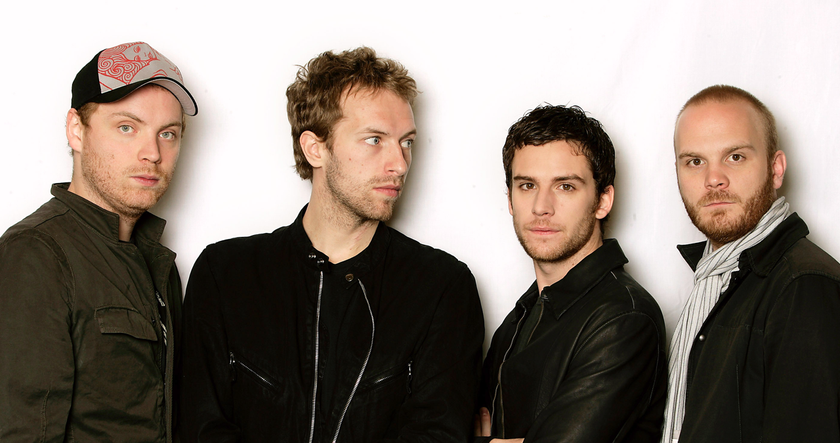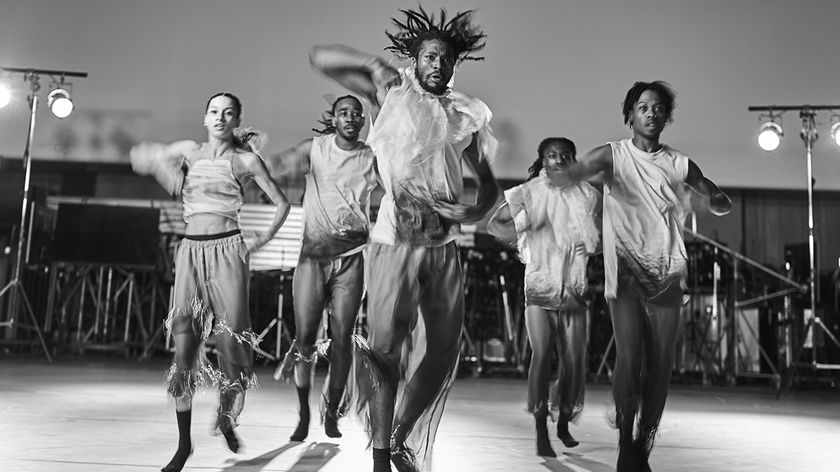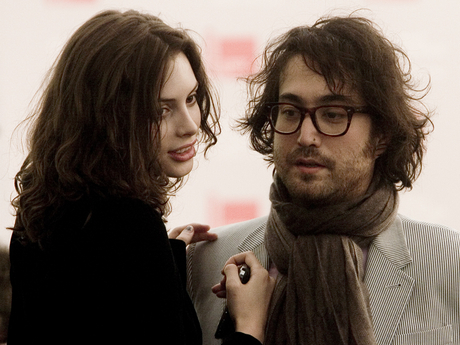
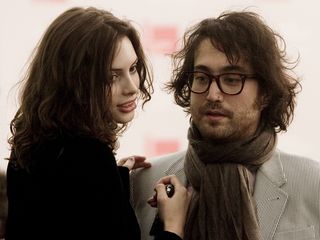
The Ghost Of A Saber Tooth Tiger. Sean Lennon, right, with musical and romantic partner Charlotte Kemp Muhl in Venice, Italy, 2009. © Alessandra Benedetti/Corbis
Sean Lennon comes right out with it: when he first laid eyes on Charlotte Kemp Muhl a few years back, his thoughts revolved around reeling in the comely model as a girlfriend. "But my friend Vincent Gallo said, "She's too wild for you," says Lennon. Kemp Muhl, seated beside Sean, laughs at the obvious absurdity. "Vincent Gallo saying I'm too crazy? The pot calls the kettle black!"
As it turned out, Lennon, 35, the only son of John Lennon and Yoko Ono, got more than be bargained for: Kemp Muhl not only become his romantic partner, but she assumed the role of his musical comrade, as well. "I had no idea she had such an incredible voice and could play so many instruments," he says. "I was pleasantly surprised."
Not that their union happened overnight. As Lennon recalls, "We didn't wind up hanging out for a couple of years. We developed our relationship through writing letters, postcards and e-mails, and it made our relationship stronger in the long run. We had actually been dating for a year before I heard her play a song she had written with a friend when they were both children. It was a called Cold Sun, and I was really surprised at how good it was. So I said, 'Well, why don't we try writing some songs together?'
"Then I found a play she wrote when she was seven called The Ghost Of A Saber Tooth Tiger, and I said, 'We should start a band with the same name.' She said yes, and that's when we wrote the song The World Was Made For Men together. It turned out to be really fun. Before long, we had written something like 50 songs together, and now we have a band."
Lennon's been in groups before, such as Cibbo Matto, and he's issued albums as a solo artist, but with Kemp Muhl, he seems to have found the perfect foil for his musical impulses. As The Ghost Of A Saber Tooth Tiger, the two have just released a haunting album full of acoustic psychedelia meets pastoral English folk called, appropriately enough, Acoustic Sessions. Amidst the duo's lilting harmony vocals, you'll hear accordion, melodica, glockenspiel and various and sundry percussion instruments.
The two promise an electric album soon, but for the moment, MusicRadar thought it was time to sit down with Lennon and Kemp Muhl to find out what makes them click so well.
Get the MusicRadar Newsletter
Want all the hottest music and gear news, reviews, deals, features and more, direct to your inbox? Sign up here.
Do you both write music and lyrics equally? Is there any kind of set collaborative process?
Kemp Muhl: "Yeah, it's a real Vulcan mind meld. It's definitely a game of ping-pong. I like to say that Sean writes all the prepositions, and I write all the adverbs." [laughs]
Lennon: "We try to keep everything very equal in the band. I find that in a lot of creative relationships, if one person dominates or the other person is just a sidekick, it doesn't work. So we collaborate totally, which includes doing the artwork and the decisions we make - all of that."
Charlotte, obviously we're familiar with Sean's musical history, but what about yours? Did you study? Were you in bands?
Kemp Muhl: "Well, I didn't go to Julliard or anything. I'm basically self-taught. When I was younger, I wrote folk songs on a guitar my father gave me. I never pursued music as a career. Lately, though, I've studied a little music theory - not with a teacher, just me and Sean. I've had to wrap my head around things pretty quickly."
You two have mentioned Syd Barrett a a big influence. Any others? I hear a little bit of Simon & Garfunkel in your vocal harmonies.
Kemp Muhl: "I grew up listening to a lot of Simon & Garfunkel and Peter, Paul and Mary. I know that sounds dorky, but I always responded strongly to that kind of lyric-driven folk music. Sean's always been more into psychedelic rock, which he's turned me onto. At the same time, I got him listening to the stuff I was into, so we do influence each other quite a bit."
How did you go about recording the album? Where did you track it and on what kind of gear?
Lennon: "We used our own home studio, which has a basic Pro Tools system. But actually, for this album, we were very lo-fi. We did it all live and in a very short period of time - six days, I think. We didn't really need any fancy equipment - we just recorded right into Pro Tools with a RCA 77 microphone, which is an old ribbon-type mic from the '60s."
Kemp Muhl: "We tried to use as much older equipment and analog gear as we could. Unfortunately, we did have to use Pro Tools, but we more than made up for it with the textures we put into it."
Lennon: "We have yet to buy a tape machine, although if the band does well, we might invest in an Ampex eight-track."
What's your process for making demos?
Kemp Muhl: [laughs] "We're pretty much Luddites when it comes to demos; we don't do anything too elaborate or high-tech. But we're hypocrites in that we did get an iPad recently, and we've been completely enamored with it; in fact, we slipped a little iPad-sampled flute onto the album. Other than that, though, it's all banjos and accordions and things like that - non-electric, old-world instruments."
Lennon: "Yeah, we've been having fun with the iPad. All the apps sound really good. I just downloaded a digital multi-track recorder, and I've been using that for demoing. We try to use whatever we can get, but it basically comes down to convenience. In an ideal world, we'd do all of our recording to an Ampex."
Sean, I've seen you pictured with Gibson acoustics. Are those your go-to guitars, or do you use other brands as well?
Lennon: "I like Martins a lot. Actually, I prefer Martins and use them more. Both Gibson and Martin make great guitars. Martins tend to be a little easier to play, whereas Gibsons are a little stiffer. I started using an old Gibson acoustic for the last Ghost tour, mainly because I put a hole in it. I thought, Well, now that it's got a hole in it I can tour with it and not worry about beating it up.
"For the most part, though, I do tend to tour with Martins. They're smaller, so I find them easier to play. I did a tour using a D-28 and it sounded great."
I like the bit of soloing you do in that live clip of Lavender Road. Do you actually sit and practice the guitar, or are you more of a feel player?
Lennon: "I do practice. Actually, Charlotte is pushing me to practice more, because on this last tour, my hand started cramping up, my fretting hand. I don't know if it's carpel tunnel or not - I should probably see a doctor. But what would happen was, my hand would stiffen up, and it would be very hard to play. I'm sure it's because I don't practice enough.
"In the past, I would only play the guitar when I was writing a song or recording. So I think if I practice about half an hour a day, even if we're not recording or doing shows, I probably won't have problems with my hand anymore. See, I'm not very disciplined in that way because I really don't consider myself an instrumentalist. I've always seen myself more as a songwriter. I only play instruments to facilitate the writing process or the recording process. I was never trying to master any instrument."
Talk to me about the song that first song you wrote together, The World Was Made For Men. It's got a lot of lyrical juxtapositions in it. It's a tad pessimistic, yet there's a bit of hope and an almost blissful naiveté to it.
Kemp Muhl: "That's the song that paved the way for our whole lyrical aesthetic, which is based around a lot of post-apocalyptic scenarios. Writing that song, we both discovered that we shared a love of sci-fi, romantic end-of-the-world metaphors and macabre, morbid things."
Sean, do you find it a little ironic that your father and mother had a musical partnership, and now here you are following in their footsteps? Have you asked your mother for any advice on this kind of arrangement?
Lennon: "It's interesting that you say that. The connection between Charlotte and me and my father and mother only came recently when we were exposed to the press. I never really thought about it before. See, Charlotte and I wrote our music together, and we share in all the creative decision making together. My mom and dad, however, were more like islands - they wrote their songs independently. There's only a couple of songs that are credited to John and Yoko together. Ninety-nine percent of the songs that they performed together were written by my mom or my dad. So, in a way, they never really had to deal with collaborative creative decision making.
"For instance, John Lennon/ Plastic Ono Band was produced by my mom, but all the songs were written by my dad, and he was singing all the songs. Yoko Ono/Plastic Ono Band was produced by my mom and my dad, but she was fronting the band and she wrote the songs. There was never any real creative quibbling because they didn't work together in the same way that Charlotte and I do. They would switch hats. One day, one person's the captain; the next day, the other person's the captain.
"In terms of getting any advice from her, she actually said to me, 'I don't know how you guys can write songs together. John and I never did that. I refused to write songs with him because it would have only complicated our relationship.' So that's it as far as her advice goes."
Kemp Muhl: "We don't have a hierarchy in how we work. It can be a creative tug of war sometimes, but I think that makes things more interesting."
Sean, it goes without saying that your voice bears some similarities to your father's -
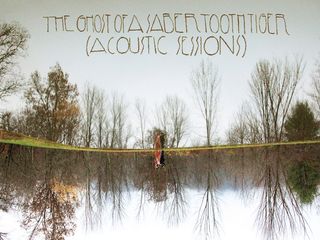
Lennon: "I only wish there were more similarities!" [laughs] "I have a lot of trouble with pitch and that kind of thing."
Because of the nature of this album, is there a certain period of your father's work that you draw from for inspiration? Maybe some of the acoustic songs from Rubber Soul?
Lennon: "That's hard to say. For Ghost…it would be a stretch to say that there's a direct line of influence. And, you know, Charlotte doesn't really know The Beatles' music. I played her Strawberry Fields Forever, and she had never heard it before. So, in many ways, she's the least influenced by my dad than anybody I've ever worked with.
"I will say that some of his chord voicings are ingrained in my psyche. His style from the Sgt Pepper and Magical Mystery Tour periods, which are my favorites, are a real part of my DNA. Maybe from the Revolver to the Magical Mystery Tour period. We don't actually take from my father consciously; it's all very sub-conscious."
Kemp Muhl: "Of all the things that Sean has played me, I really like John's psychedelic period more than his political period, even though the political stuff was incredibly moving and relevant socially. But from a pure art and song architecture perspective, I love the psychedelic stuff. We love creating these fantastical worlds, and that really comes from things like Strawberry Fields Forever and I Am The Walrus."
You know, Charlotte, it you want to brush up on The Beatles, there were these great remastered box sets released last year. Maybe Sean can slip you some copies.
Lennon: "We've had no time to listen to anything - we've been so busy. But I'd love to sit down and listen to them. I just haven't had the chance yet."
Joe is a freelance journalist who has, over the past few decades, interviewed hundreds of guitarists for Guitar World, Guitar Player, MusicRadar and Classic Rock. He is also a former editor of Guitar World, contributing writer for Guitar Aficionado and VP of A&R for Island Records. He’s an enthusiastic guitarist, but he’s nowhere near the likes of the people he interviews. Surprisingly, his skills are more suited to the drums. If you need a drummer for your Beatles tribute band, look him up.

“He was like, ‘You’ve got it all wrong, man": Mumford & Sons reveal what Neil Young told them about the way they were approaching their live shows and album recordings
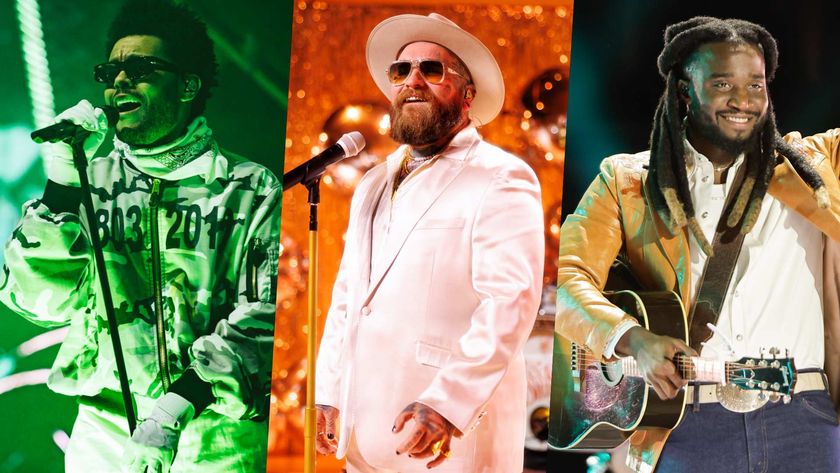
How to write a ‘sticky’ hit: Pure luck can put you in the charts, but sticking around to make the big bucks needs pure science

